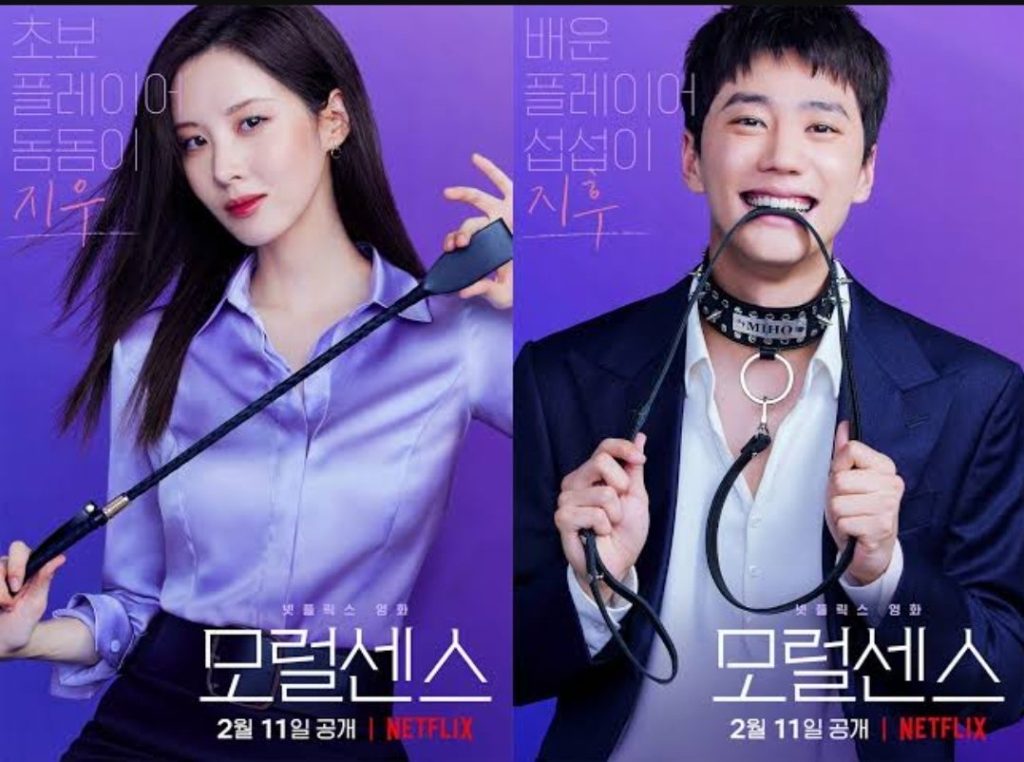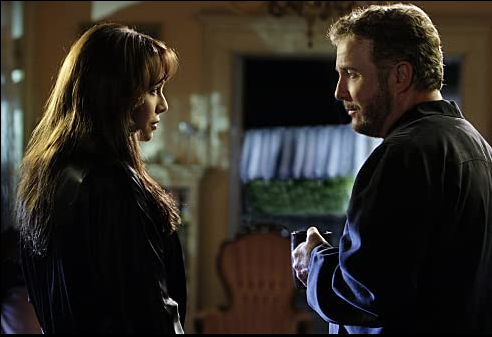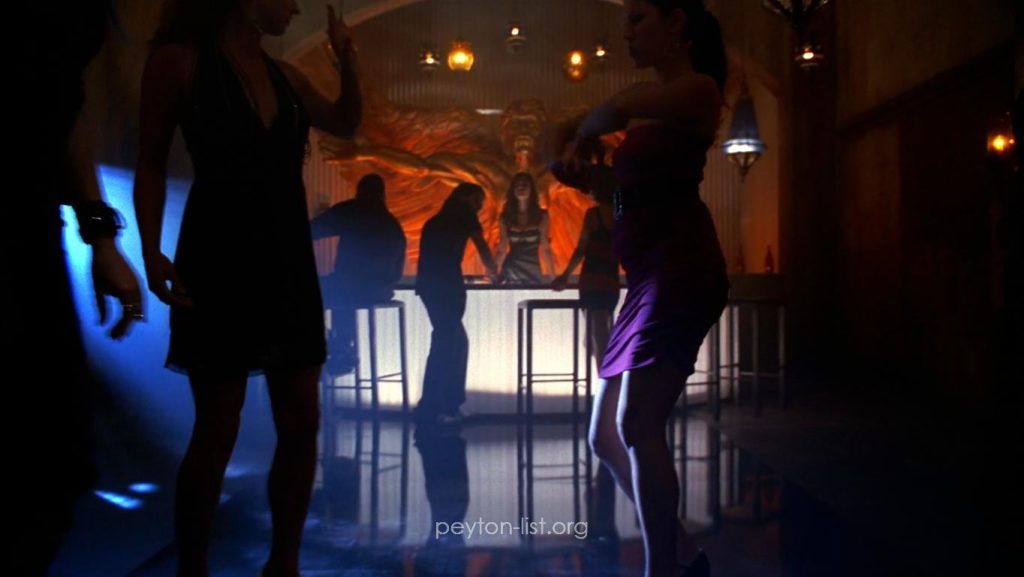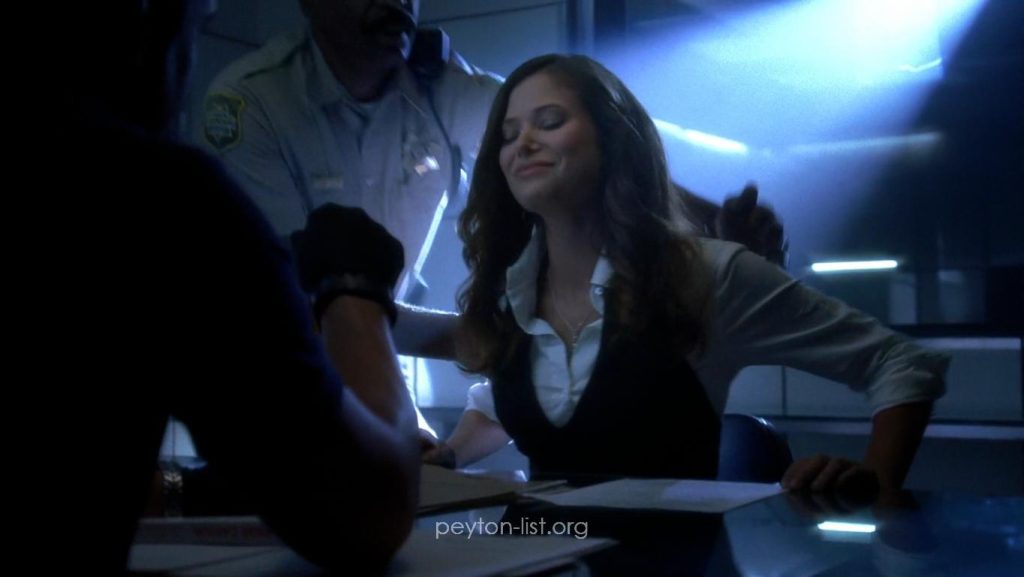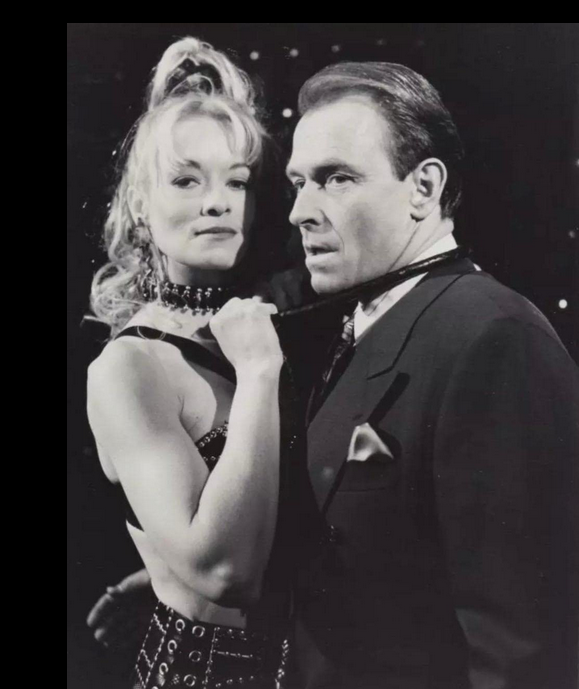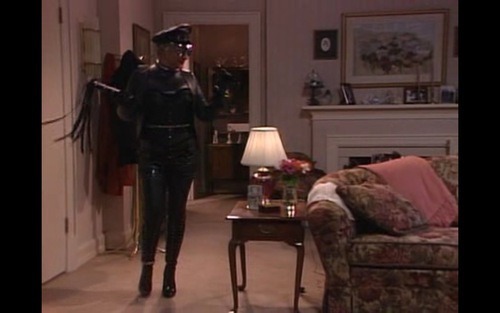Episode S03E02 “When the Battle is Over” Aired 22 Sep 2017
Jiz Lee returns as Pony, having regular domination sessions with Sarah.
Sara struggles with joining the board of her Jewish temple, and says some slut-shaming things about her ex-husband’s Millennial girlfriend. She’s insecure about being a wife and mother with her ex-husband in all ways except sexually.
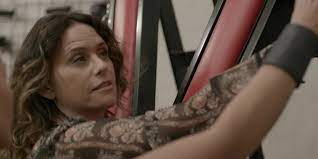
In session with Pony, Sara is miles away. She’s on a St. Andrew’s cross, in her underwear, being spanked by Pony, rambling about flyers for her temple. Shot of her face in the cross.
Pony: “Shut up, slut.”
Sara apologizes, but a moment later she resumes complaining, talking about the Jewish concept of doing volunteer work without telling anyone about it, while Pony lightly flogs her. Pony looks annoyed and stops flogging.
Pony: “Sony, if you want to come, you have to focus.”
Sarah decides to stop and pay Pony for the last fifteen minutes, trying to frame it as an act of charity. Pony needles her by saying she’s not supposed to tell anyone about it.
***
Episode S03E04 “Just the Facts” Aired 22 Sep 2017
Sara acts like a wife and mother to her ex-husband and kids, and gets into an aggressive spin class, led by her ex-husband Len’s much-younger girlfriend. They meet for the first time. Sara tries to understand the other woman’s attraction to Len, who says he is attentive and present and makes her feel safe.
In her regular session with Pony, Sara’s insecurity about her sexual attractiveness makes her want to switch. Pony is surprised but agrees. Unusually for TV, they do a brief negotiation that establishes Pony’s safeword.
Sarah still wears her print dress, with fetish boots and a black horned mask, and wields a paddle. Pony is on a low bench, with their butt up and face towards Sara, pants down and panties still on. It’s an awkward position, but it keeps Pony’s face and butt in the same frame, facing Sara.
In contrast to Pony’s usual cool butch attitude, they use a soft, child voice:
Pony: “I woke up like this. I don’t know what happened. Can you help me?”
Sara is awkward in this role. Her boot heel gets stuck in the spanking bench, but she carries on.
Pony: “Can you help me?”
Sara: “You need help?… You know, I’m sorry, just — I can’t–”
Sara takes off the mask.
Sara: “It’s like I’ve gotten totally in my head. Can we just– Can I just be me and you be you?”
Pony: “Yes ma’am.”
Sara: “Please don’t call me ma’am. I hate ma’am. Can you do ‘boss’?”
Pony: “Yes, boss.”
Sara: “I like ‘boss’.”
Sara gets more aggressive, hitting the bench near Pony with the paddle. Pony remains impassive. Sara yells into Pony’s face.
Sara: “Shut up, you stupid, fucking twat! You know what I should do? I should beat the shit out of you. That’s what I should do. I should fucking cut off your fucking head!”
Pony: “Red.”
Sara: “And piss down your throat–”
Pony: “Red.”
Sara: “You ugly, fucking cunt.”
Pony: “Red!”
Sara stops and looks horrified.
This is another scene that is cut off too soon, before we see the immediate aftermath of this scene. Does Pony cut Sara off? Do they renegotiate? Or does Sara just repress and ignore this like so much else in her life? Perhaps the whole point of Sara’s sessions with Pony is that Pony doesn’t have to be treated like a person.
The remainder of Sara’s scenes in the episode show her in a parent-teacher conference with her ex-husband. They offload their kid’s potty training problems onto his teacher. Len leaves to have a date with her girlfriend, and Sara throws herself into using her old school gym as a space for Jewish temple events.
Episode S03E09 “Off the Grid” Aired 22 Sep 2017
Sarah shows up for her regular session at Pony’s dungeon, but a stranger answers the door. He claims Pony suddenly left town to work on a family business, and that Sarah was part of the reason. “She didn’t really elaborate.”
Sarah is dismayed and asks what she’s supposed to do. The guy at the door says Pony left all her gear behind, and offers to “just flog the shit out of you.”
Sarah: “No, no, no, no. It has to be a woman.”
Guy: “Oh. Good luck with that. Pony is the only lady pro dom I know that works with chicks.”
Sarah: “Okay, that cannot be true.”
Guy: “There’s no money in it. I mean, it’s not really that hard for a woman to find someone to treat her like shit for free.”
While there probably aren’t a lot of women patronizing sex workers, I had always assumed that Pony was seeing mostly male clients and her sessions with Sarah were an exception. If Sarah is willing to pay Pony for regular sessions, she can probably find another pro domme.
The joke about women who want to suffer have no trouble finding it is awkward, as it conflates women in abusive relationships with women who are actual masochists. In my view, masochists (of any gender) don’t just want to be mistreated; they want to be mistreated in very specific ways, at the time and place of their choosing. In other words, the masochists exerts control over their sadist, and if the sadist exceeds that control, the masochist will leave “the game.”
In her next scene, Sarah finds her pet turtle has gone missing and loses it, yelling at her ex-husband Len and their children. Someone has abandonment issues.

That night, Len and Sarah are in their bedroom. Sarah apologizes for losing her temper and Len gives her a backrub. Sarah complains about Pony’s departure.
Len: “Well, how hard can it be? What does she do, just, like boss you around and slap you a little?”
Sarah: “Sort of, yeah. With some hair pulling, you know.”
Len: “Like this?”
He grabs her hair.
Sara: “Ah! Oh my god, ow. That actually hurt. That was pretty good.”
Len escalates to light spanking on Sarah’s butt, with her approval, and some dirty talk, then uses his belt to wrap her wrists and bind them over her head to the bedpost. Sara seems into it.
Len: “I know what you want. I know you better than anybody in the whole world.”
Sara’s mood abruptly changes.
Sara: “Can– I need to get– Can I get down?”
He releases her. They both apologise. Sara refers to “the arrangement.”
Len: “It’s okay. I was just joking. I was joking around.”
Sarah: “No, I liked it. It was good. I just– I don’t want to fuck everything up or anything.”
Len: “It’s fine.”
There’s a lot going on here. One dynamic is Len’s jealousy over Pony’s physical intimacy with Sarah, as he keeps comparing himself to Pony. Also, his dirty talk may have gone over her limits. His comment that he knows her better than anyone is what puts Sarah over her edge, perhaps activating her fear of being completely controlled by another person.
One possibility is that, because the terms of Sarah’s relationship with Pony are negotiated and explicit, Sarah can be emotionally and sexually open with her. In her relationship with Len, everything is suppressed and unspoken, so she can’t articulate her desires and limits, and thus can’t trust him enough. As is so often the case in mainstream media, there is no negotiation before or debriefing after play. Sarah can’t articulate her masochistic desires to Len, and therefore Len can’t meet them.
